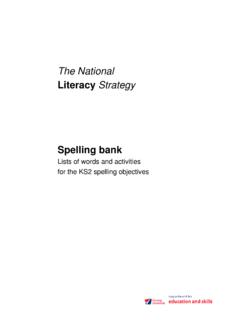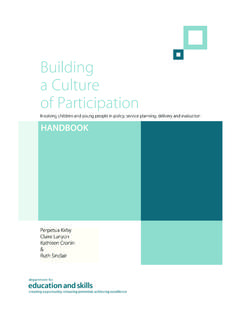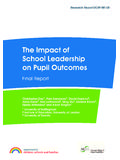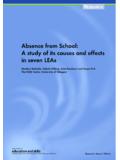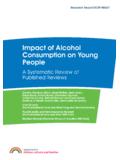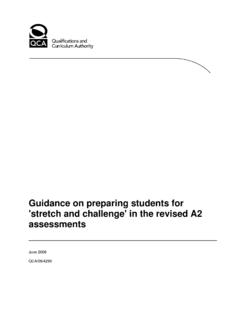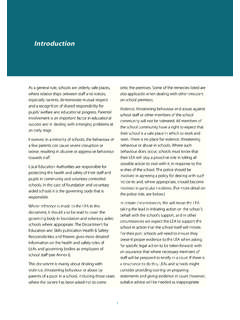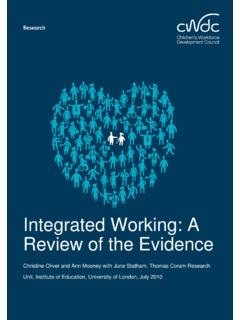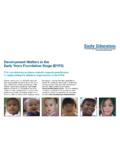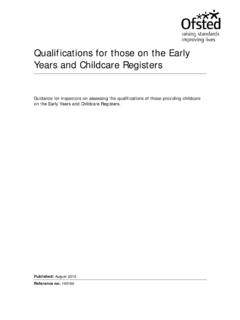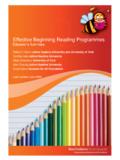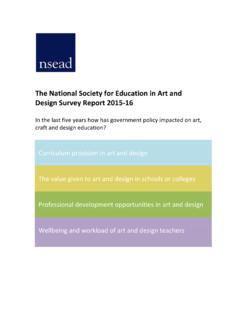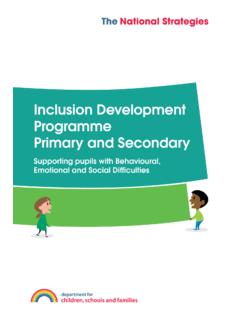Transcription of Building a Brighter Future: Early Years and Childcare …
1 Building a Brighter Future: Early Years and Childcare PlanDigital ISBN 978 0 7504 9634 6 Crown copyright 2013 WG18394 Audience This plan is aimed at everyone who leads, commissions and delivers services for children and families from pregnancy up to age seven (the end of the Foundation Phase) in Wales. This includes midwives, health visitors, school nurses, Childcare workers, play workers, teachers, teaching assistants, social workers, doctors, dentists, regional consortia, local authorities, local health boards (LHBs) and health trusts through to government and national This document defines what the Welsh Government means by the Early Years and sets outs the Welsh Government s vision for the services and system that supports them. It builds on previous strategies such as the National Service Framework for Children, Young People and Maternity Services (2005) and Nurturing Children, Supporting Families, Welsh Government Policy Statement (2011).
2 It brings together priorities, policies and programmes that impact on or influence children and their families in the Early Years and sets out plans for improvement from across the following Welsh Government Departments: Education and Skills; Communities and Tackling Poverty; Health and Social Services; Economy, Science and Transport; Housing and Regeneration; Local Government and Government Business; and Finance. The plan identifies the roles of partners in the improvement process and is underpinned by our commitment to children s rights. Action None for information Further Enquiries about this document should be directed to:Information Early Years Team Department for Education and Skills and Department for Communities and Tackling Poverty Welsh Government Cathays Park Cardiff CF10 3NQ e-mail: This document can be accessed from the Welsh Government s copies website at or a Brighter Future: Early Years and Childcare PlanTwo largest cover images: Crown copyright (2013) Visit WalesContents Ministerial foreword 2 Summary 31.
3 Why the Early Years matter 62. Children s health and well-being 193. Supporting families and parents 264. High-quality Early education and Childcare 335. Effective primary education 386. Raising standards 447. Taking the Early Years and Childcare Plan forward 51 Annex A: References 59 Annex B: Programmes and strategies 64 Annex C: Glossary 672 Building a Brighter Future: Early Years and Childcare PlanOur ambition is for all children in Wales to have a bright future. Our vision is to create a Wales of the future which is a fairer society and where every person is able to make the most of their abilities and contribute positively to the community that they live in. We do not want any of our children to be disadvantaged by poverty and want all of our children to have a flying start in life; be well-educated; enjoy the best possible health; live in a decent home; have access to an enriched environment including play, leisure, sporting and cultural activities; be listened to, treated with respect and feel safe.
4 Families and parents/carers are best-placed to raise their children. All families are different and their needs change over time. Our commitment is to help families, and particularly parents/carers, to be the best they can for their children; and if they need support, that it is timely, integrated, relevant to their needs and delivered in a way that respects the culture and language of the aim is for parents/carers, and all those that help to care for young children, to be well-informed and have the right level of skill to help all our children stay healthy, develop well and fulfil their potential. Support in the Early Years is important to children s language development in both English and Welsh, whatever the first language is within the home. We want our children to arrive at school ready and able to learn, and for everyone involved in a child s life and development to have high aspirations for them. There are many people outside the family who may work with, care for, or support a child and their family including midwives, health visitors, school nurses, therapists, Childcare workers, teachers, teaching assistants, social workers, mental health workers, doctors and dentists.
5 It is essential that this Team Around the Family (TAF) is a coordinated, well-trained and supported workforce. This is the first Early Years and Childcare Plan. In it we set out the direction of travel for the next 10 Years . We bring programmes and policies together in a more joined-up and coordinated way to support children and their families across the Early Years . We describe the key actions we will take over the short- and medium-term as we progress towards a fairer society. We intend to assess progress against this plan annually and complete a full review in three Years time. Delivering this plan will require all of us to work more closely together, with continued passion, dedication and a common purpose to help our children look forward to working with you to make this a Lewis AM Jeff Cuthbert AM Minister for Education and Skills Minister for Communities and Tackling PovertyMinisterial forewordSummary3 Building a Brighter Future: Early Years and Childcare PlanBy the time children reach the age of seven we want them to have the right foundations for good health, be actively engaged in learning and be equipped with the skills to reach their full potential.
6 Building a Brighter Future: Early Years and Childcare Plan1 sets out our commitment to improve the life chances and outcomes of all children in Wales. There are seven sections. Section 1 sets the scene for improvement and explains why investing in the Early Years is so 2 focuses on children s health and well-being. A baby born at full term after a healthy, well-nourished pregnancy free of smoking and alcohol, at normal birth weight, fully breastfed and immunised, in safe surroundings, and receiving emotional warmth from their parents2, is more likely to become a healthy adult. A child s health, in terms of physical, intellectual, emotional, social and behavioural well-being, is strongly influenced throughout pregnancy and childhood by their parents health, lifestyle and behaviour, as well as the quality of the child s relationships, particularly with their mother. We will focus on prevention, improving the quality of care of health services for children in the Early Years and the integration of services to ensure children are given the best start in life.
7 We will promote child development and family health by delivering universal and targeted programmes such as the breastfeeding and immunisation programmes, and we will develop an all-Wales child health importance of strong and positive families is set out in Section 3. Children do better when they live in a good-quality and safe home, have a close, positive and secure relationship with their mother, father or with another key adult. We know that what parents do with their children at home has a significant impact and can have a stronger influence than their occupation, education or income. Reading, singing and playing with their child are essential activities to support the development of speaking, listening and language comprehension skills which are key predictors of future progress and readiness for school. They are also important in helping to build positive relationships between parents and their children. We will ensure that families, parents and children get the information, advice and support they need when they need it.
8 We will be steadfast in our support for Early communication and language acquisition in English, Welsh or both languages, through programmes such as Bookstart and Twf, as well as for those for whom English or Welsh are additional languages and we will pilot approaches to family learning in the Early Years . We will ensure that all social housing meets the Welsh Housing Quality Standard by 2020. High-quality Early education and Childcare is the theme of Section 4. Attending a high-quality Childcare setting or Early Years education provider has a significant influence on a child s development, especially those children who come from a disadvantaged background. Affordable, flexible and accessible Childcare also enables parents to work or access training, and supports our drive to increase economic growth, tackle poverty and 1 The Childcare element of this plan reaches beyond age seven because many of the issues and policies being taken forward will be relevant for those working with children aged eight and Parent is used as a generic term throughout this document.
9 It can mean any significant adult that is proactively involved in parenting a child or children and includes mothers, fathers, carers, foster and adoptive parents, guardians and corporate parents. 4 Building a Brighter Future: Early Years and Childcare Planreduce inequalities. We will work with the inspectorates, the sector and local authorities to drive improvements in the quality of Childcare and support and develop the Childcare market. We will develop proposals for flexible delivery of Flying Start Childcare , parenting and Early language support, consider a more flexible approach to the Foundation Phase, look at ways to improve the availability of wrap-around holiday Childcare and play provision and introduce a Voluntary Childcare Approval Scheme for over-eights Childcare . Having a good primary education is addressed in Section 5. We are clear that learning in the Early Years supports learning in primary school. The relationships between schools, providers, support services and parents are crucial to enabling children to perform well.
10 The best schools and Early education providers take a whole view of the child, support their physical health, mental and emotional development, and help them move resiliently from one stage of learning to another. We will support the development of a whole-school approach to the Foundation Phase, roll out the National Literacy and Numeracy Framework (LNF), National Reading and Numeracy Tests and the National Support Programme (NSP) as well as continue with our commitment to reduce inequalities through the innovative use of the Pupil Deprivation Grant and the Minority Ethnic Achievement Grant. Section 6 sets out how we expect to raise standards. Our systems and processes must place a strong emphasis on continuously improving outcomes and raising standards, while closing the gap between the most and least disadvantaged. To reinforce our key priorities we need to ensure that delivery of support for our children and families is right from the outset.


